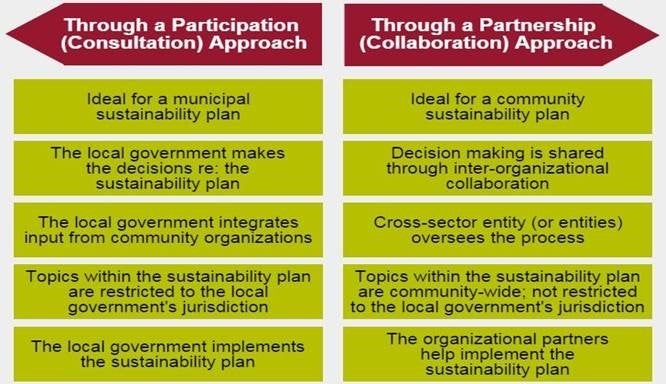Participation versus partnership
With regards to community sustainability, there are two contrasting approaches for engaging stakeholders in successful plan implementation. The first approach is participation or stakeholder consultation. This type of approach is ideal for a municipal sustainability plan as it relates to the normal mandate of the local government. Typically the content in a municipal sustainability plan is restricted to the local government’s jurisdiction. In this approach, the local government conducts the decision-making. With that being said, the local government receives input from stakeholders when formulating the plan. Despite the collaborative input from additional stakeholders, the local government remains responsible for implementing the plan.
The second approach is through a partnership or collaboration approach. This approach is ideal for a community sustainability plan and involves a higher degree of engagement from numerous organizational stakeholders, as the local government collaborates with stakeholders on joint sustainability initiatives. This approach involves collective and strategic decision-making in order to incorporate the ideas of multiple stakeholders into the development of a community sustainability plan. As a result, the sustainability plan involves key partners during the implementation process with partners making commitments to collective goals and distributed actions. This approach also allows for the inclusion of local government considerations, as well as community-wide considerations that go beyond the jurisdiction of the local government.
In comparison to the participation approach, the partnership approach requires greater investment on behalf of the stakeholders. This involvement must be maintained throughout the implementation process to ensure the success of the plan and stakeholders are provided with more opportunities to lead sustainability projects. The partnership approach can manifest in a variety of ways in order to meet the individual needs of a specific community. Although this approach focuses on cross-sector social partnership(s), a leading organization (generally the local government) is recommended to ensure successful implementation of the community sustainability plan.
The graphic below provides a summary of this content:

This content has been derived from:
Clarke, A. & Erfan, A. (2007). Regional Sustainability Strategies: A Comparison of Eight Canadian Approaches. Plan Canada, 47(3): 15-18.
- View pre-publication version: Regional Sustainability Strategies: A Comparison of Eight Canadian Approaches